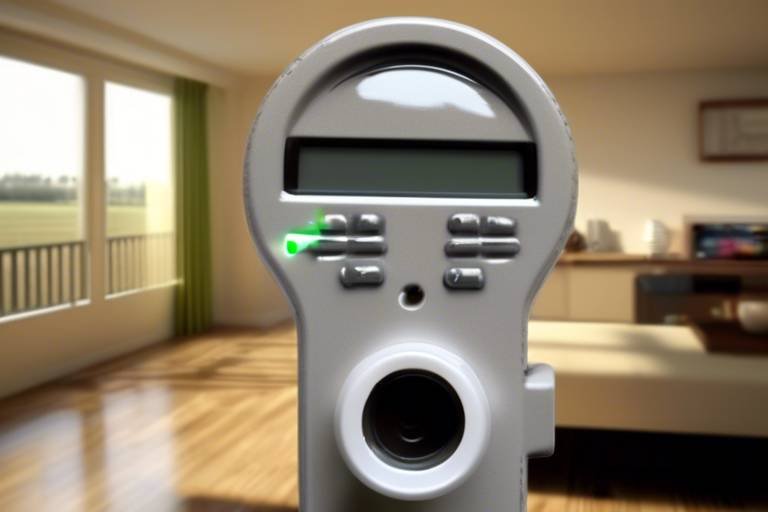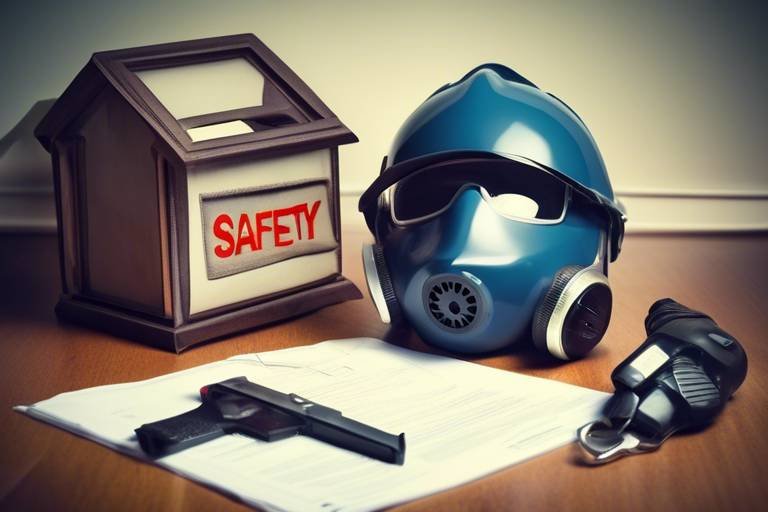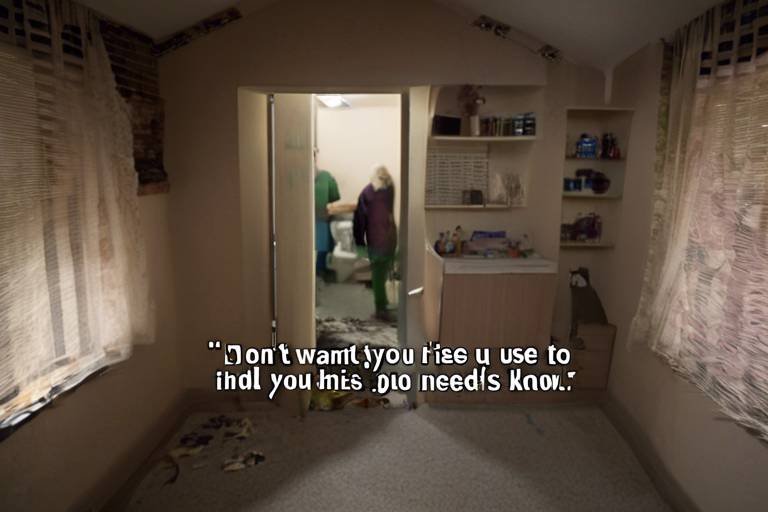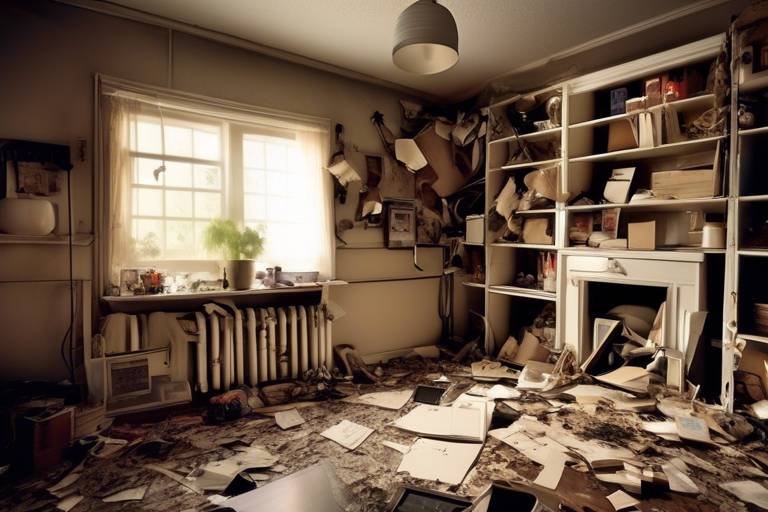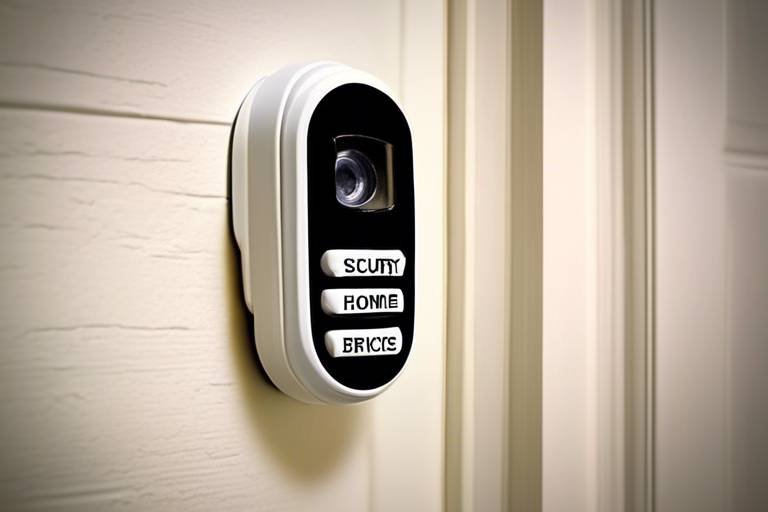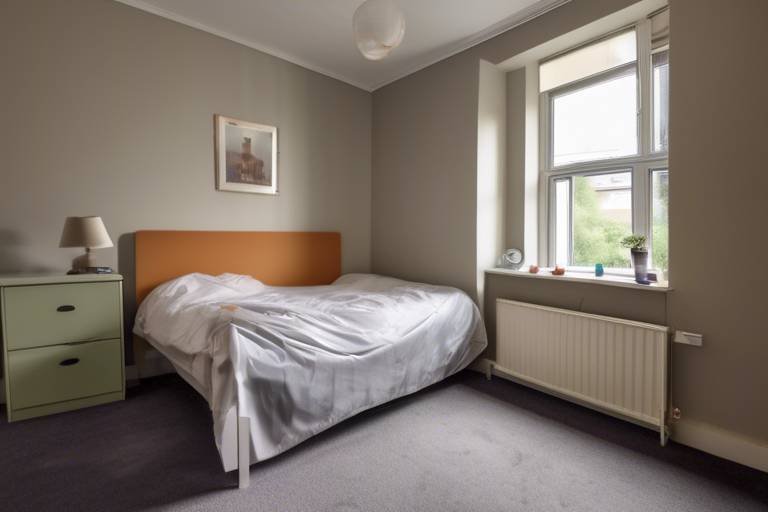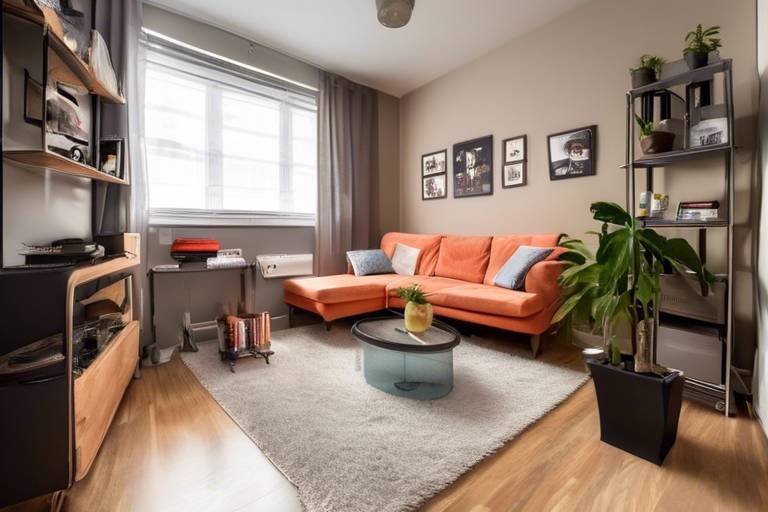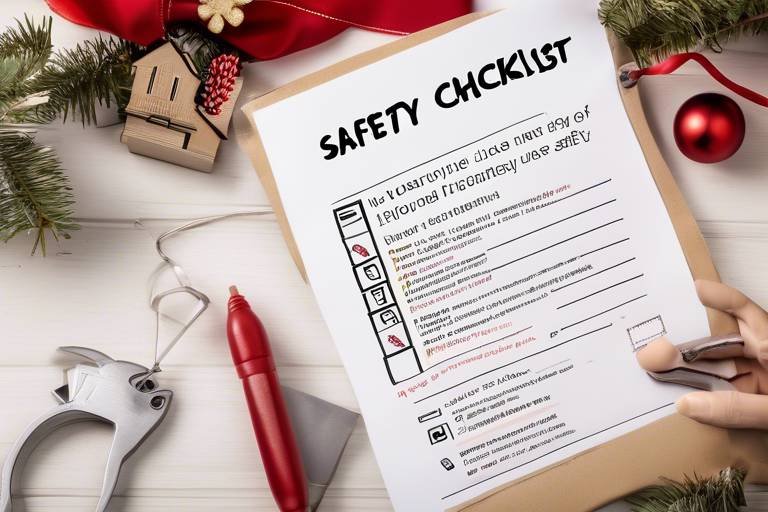The Reliability of Home Alarm Systems
In today’s world, the safety of our homes is more important than ever. With rising crime rates and increasing concerns about personal security, many homeowners are turning to home alarm systems as a protective measure. But how reliable are these systems really? This article dives deep into the effectiveness and trustworthiness of home alarm systems, exploring the various factors that influence their reliability and the overall impact they have on home security. From understanding the different types of alarm systems available to the importance of proper installation and maintenance, we’ll cover everything you need to know to make an informed decision about your home’s safety.
Home alarm systems come in a variety of forms, each designed to cater to different security needs and preferences. Whether you're considering a basic setup with a few sensors or an advanced smart security system that integrates with your home automation, understanding these options is crucial. Basic systems typically include door and window sensors, while more sophisticated models may offer features like motion detectors, surveillance cameras, and smartphone connectivity. This range of choices allows homeowners to tailor their security solutions to fit their lifestyle and budget, ensuring that they can achieve the level of protection they desire.
When it comes to the reliability of home alarm systems, several factors play a significant role. The quality of installation, the technology used, and the ongoing maintenance of the system are all critical components that can influence performance. For instance, a high-tech alarm system installed poorly may lead to false alarms or, worse, a complete failure to alert homeowners during an emergency. Understanding these elements can help homeowners make better choices about their security systems and ensure they are investing in a solution that will genuinely protect their homes.
Proper installation is crucial for the effectiveness of alarm systems. Many homeowners might consider a DIY approach to save money, but the truth is, professional installation often ensures a higher level of reliability. A skilled technician will know how to properly position sensors and cameras, minimizing blind spots and ensuring that the system functions as intended. In contrast, a DIY installation might overlook critical details, leading to vulnerabilities that could compromise the system’s effectiveness.
Choosing between professional installation and a DIY approach can significantly influence the system's reliability. While DIY installation may seem appealing for its cost-saving benefits, it often comes with hidden risks. Professionals bring expertise and experience, ensuring that every component is correctly installed and calibrated. On the other hand, DIY installations can lead to errors that not only affect performance but can also void warranties. Ultimately, investing in professional installation can save you from future headaches and enhance your peace of mind.
Understanding common installation errors can prevent potential issues. Here are some frequent mistakes to watch out for:
- Improper sensor placement, which can create blind spots.
- Neglecting to secure all entry points, such as windows and basements.
- Failing to test the system after installation to ensure everything works correctly.
By being aware of these pitfalls, homeowners can take proactive steps to ensure a reliable setup for their home alarm systems.
The technology behind alarm systems plays a vital role in their reliability. Modern systems often come equipped with features such as real-time alerts, remote access, and integration with other smart home devices. These advancements not only enhance security but also provide homeowners with greater control over their systems. For instance, a homeowner can receive instant notifications on their smartphone if an alarm is triggered, allowing for quicker responses to potential threats. Furthermore, advancements in technology continue to improve the functionality and reliability of these systems, making them more effective than ever.
Regular maintenance is essential for the long-term reliability of home alarm systems. Just like any other technology, alarm systems require routine checks and updates to ensure they are functioning optimally. Neglecting maintenance can lead to malfunctions or outdated technology that may not adequately protect your home. Homeowners should prioritize regular inspections and be aware of best practices for upkeep to maintain the reliability of their systems.
Conducting routine checks on alarm systems can prevent malfunctions. Regular maintenance schedules should include checking battery levels, testing sensors, and ensuring that all components are functioning correctly. Homeowners should also be vigilant about replacing outdated technology, as older systems may not meet current security standards. By staying proactive with routine checks, you can significantly enhance the reliability of your home alarm system.
Keeping alarm systems updated with the latest technology is crucial for reliability. As technology evolves, so do the tactics used by intruders. Upgrading your alarm system can enhance security measures in your home, providing better protection against potential threats. Many manufacturers offer software updates and new features that can be easily integrated into existing systems, ensuring that your home remains secure against emerging threats.
To wrap things up, let’s address some common questions homeowners have about the reliability of home alarm systems:
- How often should I test my alarm system? It’s recommended to test your system at least once a month to ensure everything is functioning properly.
- Can I install a home alarm system myself? While DIY installations are possible, professional installation is often recommended for optimal reliability.
- What should I do if my alarm goes off accidentally? Familiarize yourself with your system’s features and consult your user manual for troubleshooting tips.
By understanding these aspects of home alarm systems, you can make informed decisions that enhance the safety and security of your home.

Understanding Home Alarm Systems
When it comes to securing your home, home alarm systems are often the first line of defense. These systems vary widely, from simple setups that merely sound an alarm to sophisticated networks that integrate with smart home technology. Understanding the different types available is crucial for homeowners looking to make informed decisions about their security. So, what exactly do these systems entail?
At their core, home alarm systems are designed to detect unauthorized entry and alert homeowners or authorities. They can be categorized into several types, including:
- Wired Systems: These systems use physical wires to connect sensors and alarms. While they are generally reliable and less susceptible to interference, installation can be more complex and costly.
- Wireless Systems: These are easier to install and can be placed anywhere without worrying about wires. However, they may be vulnerable to signal interference.
- Monitored Systems: These systems are connected to a monitoring service that can respond to alarms. This adds an extra layer of security but often comes with a monthly fee.
- Unmonitored Systems: These systems will sound an alarm but do not alert authorities. They can be a cost-effective solution for some homeowners.
- Smart Alarm Systems: With the rise of technology, smart alarms can be controlled via smartphones and can integrate with other smart devices in your home, offering convenience and enhanced security.
Each type of alarm system comes with its own set of features and benefits. For instance, smart alarm systems often include features like remote monitoring, motion detection, and even video surveillance, providing homeowners with real-time updates about their property. Imagine being able to check in on your home while you're halfway across the world! This level of connectivity not only gives peace of mind but also enhances the overall effectiveness of the security system.
Moreover, many modern alarm systems offer customizable options. Homeowners can choose specific sensors for doors, windows, or motion detection, tailoring their system to meet their unique needs. This level of personalization means that you can create a security setup that fits your lifestyle and home layout perfectly. Think of it as building a security fortress tailored just for you!
In summary, understanding the various types of home alarm systems is essential for making an informed choice. Whether you prefer a traditional wired system or a cutting-edge smart solution, knowing the options available will empower you to enhance your home's security effectively. Investing in a reliable alarm system is not just about protecting your property; it’s about safeguarding your peace of mind.

Factors Influencing Reliability
When it comes to home alarm systems, their reliability is not just a matter of chance; it's influenced by a variety of factors that can make or break your security setup. Understanding these factors is crucial for homeowners who want to ensure their peace of mind. The reliability of an alarm system can hinge on elements such as installation quality, the technology used, and ongoing maintenance practices. Let’s dive deeper into each of these aspects and see how they play a role in the overall effectiveness of home security systems.
The first step in ensuring your home alarm system is reliable is the installation process. It's not just about plugging in a few devices and calling it a day; proper installation is critical. A poorly installed system can lead to false alarms, missed alerts, and even complete system failures. Homeowners often face a dilemma: should they hire a professional or attempt a DIY installation? While DIY may seem appealing due to cost savings, it can lead to costly mistakes. Professional installers have the expertise to ensure that every component is placed correctly and functions as intended, which significantly enhances reliability.
Choosing between professional installation and DIY can feel like a toss-up, but let’s break it down. Professional installers bring a wealth of experience and knowledge that can save you headaches down the line. They understand the nuances of different systems and can tailor the installation to your specific home layout. On the other hand, a DIY installation might save you money upfront, but it can lead to issues that may not surface until it’s too late. Imagine spending all that time and effort only to find out your system isn't working when you need it most!
To further illustrate the importance of proper installation, let’s look at some common mistakes that can undermine the reliability of home alarm systems:
- Incorrect Sensor Placement: Sensors need to be strategically placed to detect motion effectively. If they're too high, too low, or facing the wrong direction, they won’t work as intended.
- Neglecting the Control Panel: The control panel is the brain of your alarm system. If it’s not easily accessible or properly connected, you might find yourself in a bind during an emergency.
- Overlooking Environmental Factors: External factors like weather can affect your system. For instance, placing outdoor cameras in direct sunlight can lead to overheating.
By being aware of these pitfalls, homeowners can take steps to avoid them, ensuring a more reliable alarm system right from the start.
Next up is the technology behind your alarm system. The advancements in technology have transformed home security, making systems more reliable than ever before. Features such as motion detectors, door/window sensors, and smart home integration are just a few elements that enhance the performance of alarm systems. For example, modern systems utilize wireless technology, which not only simplifies installation but also reduces the risk of tampering. Moreover, many systems now come equipped with smartphone apps that allow homeowners to monitor their properties in real-time, providing an extra layer of assurance.
In summary, the reliability of home alarm systems is influenced by a multitude of factors. From the quality of installation to the technology employed, each element plays a crucial role in ensuring that your home remains secure. By investing time and effort into understanding these factors, homeowners can make informed decisions that enhance their overall security.
Q: How often should I test my home alarm system?
A: It's recommended to test your alarm system at least once a month to ensure all components are functioning properly.
Q: Can I install a home alarm system myself?
A: Yes, but it’s crucial to follow the manufacturer’s instructions carefully. However, professional installation is often recommended for optimal reliability.
Q: What should I do if my alarm system goes off accidentally?
A: First, ensure that there is no real threat. If it was a false alarm, reset the system and check for any issues. If it continues to happen, consult a professional.
Q: How can I improve the reliability of my home alarm system?
A: Regular maintenance, proper installation, and keeping the system updated with the latest technology can significantly enhance reliability.

Installation Quality
When it comes to home alarm systems, is a critical factor that can make or break the system's effectiveness. Imagine purchasing a state-of-the-art alarm system, only to find out that it fails to perform because it was poorly installed. It's like buying a high-performance sports car and never taking it out of first gear! The way your alarm system is set up can determine not just how well it functions, but also how reliable it is in times of need.
Professional installation is often recommended for several reasons. First and foremost, trained technicians understand the intricacies of various alarm systems, ensuring that every component is placed correctly and functions as intended. They can also assess your home's unique security needs, tailoring the system to provide optimal coverage. On the other hand, DIY installations may seem appealing due to cost savings, but they often come with risks. Homeowners may overlook critical aspects such as sensor placement, wiring issues, or connectivity problems, which can lead to a false sense of security.
Consider this: a well-installed alarm system can detect intrusions effectively, alerting you and law enforcement promptly. In contrast, a poorly installed system may not trigger at all or may send false alarms, leading to frustration and possible fines. Here are some common pitfalls of DIY installation that can compromise reliability:
- Poor Sensor Placement: Sensors need to be strategically located to cover entry points effectively. A misplaced sensor might miss an intruder entirely.
- Inadequate Wiring: Faulty wiring can lead to communication issues between components, rendering the system ineffective.
- Neglecting Environmental Factors: Outdoor sensors can be affected by weather or landscaping; professionals know how to mitigate these risks.
Ultimately, the choice between professional and DIY installation boils down to your comfort level with technology and your home's specific security needs. If you opt for the DIY route, it’s essential to invest time in understanding the installation process thoroughly. Following the manufacturer's guidelines and perhaps watching instructional videos can help you avoid common mistakes.
In conclusion, the quality of installation significantly impacts the reliability of home alarm systems. Whether you choose to go with a professional service or take the DIY approach, ensuring that the system is installed correctly will provide peace of mind and enhance your home's security. Remember, a reliable alarm system is only as good as its installation!

Professional vs. DIY Installation
When it comes to installing a home alarm system, homeowners often face a critical decision: should they go for professional installation or take the DIY route? This choice can greatly influence the reliability and effectiveness of the alarm system. Let's break this down.
On one hand, professional installation offers the advantage of expertise. Skilled technicians are trained to understand the intricacies of various alarm systems, ensuring that every component is installed correctly. They can assess your home’s unique layout and recommend the best locations for sensors and cameras, maximizing coverage and minimizing blind spots. Plus, many professional services offer warranties on their installations, giving homeowners peace of mind.
Conversely, DIY installation can be appealing to those who love hands-on projects or want to save money. With many user-friendly systems available on the market, it’s possible for tech-savvy individuals to set up their alarms without professional help. However, this approach can lead to potential pitfalls. For instance, improper placement of sensors could result in gaps in security, making your home vulnerable. Additionally, if something goes wrong, you might not have the support that a professional service would provide.
To help you weigh your options, here’s a quick comparison:
| Factor | Professional Installation | DIY Installation |
|---|---|---|
| Expertise | High - Trained technicians | Variable - Depends on user skill |
| Cost | Higher upfront cost | Lower upfront cost |
| Time | Quick installation | Time-consuming, depending on complexity |
| Warranty | Often includes a warranty | No warranty for self-install |
Ultimately, the choice between professional and DIY installation boils down to your comfort level with technology and your home's specific needs. If you’re unsure, consulting with a professional can provide valuable insights that might save you from costly mistakes down the line. Remember, a reliable alarm system is only as good as its installation!
- What are the benefits of professional installation? Professional installation ensures that your system is set up correctly and efficiently, often including a warranty for added security.
- Can I install a home alarm system myself? Yes, many systems are designed for easy DIY installation, but it requires a good understanding of the technology involved.
- What common mistakes should I avoid when installing my alarm system? Avoid poor sensor placement, neglecting to read the manual, and failing to test the system after installation.

Common Installation Mistakes
When it comes to installing a home alarm system, many homeowners dive in with enthusiasm, eager to secure their homes. However, this excitement can often lead to that may compromise the very security they seek to enhance. One of the most prevalent errors is the inadequate placement of sensors. For instance, if motion detectors are installed too high or too low, they may fail to detect movement effectively, leaving vulnerable areas exposed. It's crucial to consider the layout of your home and the specific areas that require monitoring.
Another frequent pitfall is neglecting to secure entry points. Many homeowners focus solely on the front door, forgetting that windows and back doors are equally important. A comprehensive approach to security should include all potential entry points. Additionally, many systems come with a variety of sensors and cameras, yet some homeowners choose to ignore them, thinking they can get by with just the basics. This can lead to gaps in security coverage.
Moreover, overlooking the importance of a strong Wi-Fi connection can be a critical mistake, especially for smart alarm systems that rely on internet connectivity. If your Wi-Fi signal is weak or inconsistent, your alarm system may not function properly, leaving you at risk. Ensuring a robust and stable internet connection is essential for the effectiveness of these modern systems.
Lastly, failing to test the system after installation is a mistake that many make. Testing your alarm system ensures that all components are working correctly and that you understand how to operate them effectively. It’s like buying a new car and not taking it for a test drive; you might miss out on discovering a flaw that could be critical later on.
In conclusion, avoiding these common installation mistakes can significantly enhance the reliability of your home alarm system. By paying attention to sensor placement, securing all entry points, ensuring a strong internet connection, and thoroughly testing the system, homeowners can create a more secure environment. Remember, the goal is to protect your home and loved ones, and a well-installed alarm system is a vital part of that strategy.
Q1: What are the most common mistakes made during alarm system installation?
A1: Common mistakes include inadequate sensor placement, neglecting to secure all entry points, overlooking Wi-Fi connectivity, and not testing the system after installation.
Q2: How can I ensure proper sensor placement?
A2: Consider the layout of your home, and install sensors at a height that maximizes their detection capabilities, typically around 6-8 feet from the ground.
Q3: Why is it important to test my alarm system?
A3: Testing your alarm system ensures all components are functioning properly, helping you identify any issues before they become a security risk.
Q4: Should I hire a professional for installation?
A4: While DIY installation can be tempting, hiring a professional can help ensure that your system is installed correctly and securely, maximizing its reliability.

Technology and Features
When it comes to home alarm systems, the technology and features they offer can make a world of difference in terms of reliability and effectiveness. In today's fast-paced world, homeowners are looking for systems that not only protect their property but also integrate seamlessly with their lifestyles. From basic motion detectors to sophisticated smart home integrations, the options are vast and can be overwhelming. So, what should you look for when choosing an alarm system? Let's break it down.
One of the key aspects of modern alarm systems is their connectivity. Many systems now come equipped with Wi-Fi capabilities that allow homeowners to monitor their security from anywhere in the world through a smartphone app. Imagine being on vacation and receiving a notification that your alarm has been triggered; you can check your camera feeds in real-time, ensuring peace of mind no matter where you are. This level of connectivity is not just a luxury but a necessity in today’s connected world.
Another important feature to consider is the type of sensors used in the system. Most alarm systems utilize a combination of motion sensors, door/window sensors, and sometimes even glass break sensors. These sensors work together to create a comprehensive security network around your home. For instance, motion sensors can detect movement in designated areas, while door/window sensors alert you if an entry point is breached. The more comprehensive the sensor network, the better the system can protect your home.
Furthermore, the integration of smart home technology into alarm systems is a game changer. Systems that can connect with other smart devices—like lights, locks, and cameras—offer enhanced security features. For example, if your alarm system is triggered, it can automatically turn on the lights to deter intruders or lock all doors to prevent entry. This interconnectedness not only increases security but also adds convenience to your daily life.
Additionally, the user interface of the alarm system plays a crucial role in its overall reliability. A system that is difficult to navigate can lead to mistakes during critical moments. Look for systems with intuitive interfaces, whether they are accessed through a keypad or a mobile app. Clear displays, easy-to-understand icons, and straightforward navigation can make all the difference in an emergency situation.
Lastly, let’s not forget about backup systems. A reliable alarm system should have a backup power source, such as a battery, to ensure it remains operational during power outages. Some advanced systems even offer cellular backup, which means they can still communicate with monitoring services even if your internet goes down. This redundancy is essential for maintaining security at all times.
In summary, when evaluating the technology and features of home alarm systems, consider the following:
- Connectivity: Look for systems with Wi-Fi and mobile app integration.
- Sensor Types: Ensure a combination of motion, door/window, and glass break sensors.
- Smart Home Integration: Choose systems that work with other smart devices.
- User Interface: Opt for systems with intuitive controls.
- Backup Systems: Ensure there are power and communication backups.
By focusing on these technological features, homeowners can choose a reliable alarm system that not only meets their security needs but also fits seamlessly into their modern lifestyles. Investing in the right technology can significantly enhance the protection of your home, giving you the confidence you need to feel safe and secure.
1. What is the best type of alarm system for my home?
The best type of alarm system depends on your specific needs. Consider factors like the size of your home, the level of security you desire, and whether you want smart home integration.
2. How often should I maintain my alarm system?
Regular maintenance checks at least once a year are recommended to ensure your alarm system is functioning properly.
3. Can I install an alarm system myself?
Yes, many systems offer DIY installation options, but professional installation is often recommended for optimal reliability.
4. What should I do if my alarm goes off accidentally?
Stay calm and check the system for any alerts. If it’s a false alarm, reset the system and ensure all sensors are functioning correctly.

Maintenance and Upkeep
When it comes to ensuring the longevity and reliability of your home alarm system, are key. Just like a car needs regular oil changes and tire rotations to run smoothly, your alarm system requires consistent attention to function at its best. Think of it as a relationship; it needs nurturing and care to keep it strong. Neglecting routine maintenance can lead to unexpected failures, which is the last thing you want when it comes to your home security.
Regular maintenance not only helps in identifying potential issues before they escalate but also ensures that your system is equipped with the latest updates and features. A well-maintained alarm system can provide peace of mind, knowing that your home is protected against intruders. So, what does maintaining an alarm system entail? Here are some essential practices:
- Routine Inspections: Conducting thorough inspections of your alarm system at least once a year is crucial. This includes checking all sensors, cameras, and control panels to ensure they are functioning correctly.
- Battery Checks: Most alarm systems rely on battery power, so it’s essential to check and replace batteries regularly. A dead battery can render your system useless, leaving your home vulnerable.
- Software Updates: Just like your smartphone or computer, alarm systems often require software updates to improve performance and security. Keeping your system updated can protect against vulnerabilities.
During these routine checks, homeowners should look for signs of wear and tear, such as frayed wires or malfunctioning sensors. It's also a good idea to test the alarm system by triggering it to ensure that it responds appropriately. If you notice any discrepancies or issues, contacting a professional technician for assistance is wise.
Moreover, maintaining an alarm system is not just about fixing problems; it’s also about enhancing its capabilities. As technology advances, many alarm systems can be integrated with smart home devices. This means that regular upgrades can significantly improve your home security. For instance, adding smart locks or surveillance cameras can provide an extra layer of protection, making your home even safer.
In summary, maintaining and caring for your home alarm system is not a one-time task but an ongoing commitment. By adhering to a routine maintenance schedule and staying updated with technological advancements, you can ensure that your alarm system remains reliable and effective. After all, your home deserves the best protection possible!
Here are some common questions homeowners have regarding the maintenance and upkeep of their alarm systems:
- How often should I check my alarm system? It's recommended to perform routine checks at least once a year, but quarterly checks are ideal for optimal performance.
- What should I do if my alarm goes off unexpectedly? First, check for any signs of a break-in. If everything seems normal, it could be a false alarm. However, it’s best to contact your security provider for assistance.
- Can I perform maintenance myself? While some maintenance tasks can be done by homeowners, it’s advisable to consult a professional for more complex issues.

Routine Checks
When it comes to ensuring the reliability of your home alarm system, are absolutely essential. Think of your alarm system as a car; just like your vehicle needs regular oil changes and tire rotations to run smoothly, your alarm system requires consistent maintenance to function effectively. Performing routine checks not only helps in identifying potential issues before they escalate but also ensures that your system is always ready to protect your home when it matters most.
So, what exactly should you be looking for during these routine checks? First and foremost, it's important to test the alarm's functionality. This means triggering the alarm to see if it sounds off as expected. You should also check the sensors and cameras to ensure they are operational. Are the motion detectors picking up movement? Is the camera lens clear and unobstructed? These are critical components that need to be in top shape to provide effective security.
Another vital aspect of routine checks is inspecting the power supply. Many alarm systems rely on battery backups, and over time, these batteries can lose their charge. It's wise to replace them every few years, even if they seem to be working fine. Additionally, ensure that your system is connected to a reliable power source. An unexpected power outage can render your security system ineffective, so having a backup plan, like a generator, could be a lifesaver.
Moreover, don't forget to check the control panel. This is the brain of your alarm system, and any issues here can compromise your entire setup. Look for error messages or warning lights that could indicate a malfunction. Keeping the control panel clean and free from dust and debris can also help maintain its performance.
Finally, consider setting up a routine maintenance schedule. You might want to perform these checks quarterly or biannually, depending on your system's complexity and usage. You can even keep a log of your checks to track any recurring issues or improvements over time. Remember, the goal is to keep your home as secure as possible, and a little diligence can go a long way in achieving that.
- How often should I perform routine checks on my home alarm system?
It's recommended to conduct routine checks at least once every three to six months to ensure everything is functioning properly. - What should I do if I find a malfunction during a routine check?
If you discover any issues, it's best to contact a professional technician to assess and resolve the problem. - Can I perform routine checks myself, or should I hire a professional?
You can certainly perform basic checks yourself, but for more complex systems, hiring a professional can ensure everything is thoroughly inspected.

Updating Technology
In the fast-paced world of technology, keeping your home alarm system updated is not just a good idea—it's essential. With advancements occurring at lightning speed, new features and improvements can significantly enhance the reliability of your security measures. Imagine your alarm system as a smartphone; just like you wouldn’t want to use a decade-old model, you wouldn’t want to rely on outdated security technology either. So, what does updating your alarm system entail, and why is it so crucial?
First and foremost, regular updates can help protect your home from vulnerabilities. Just as software developers release updates to fix bugs and enhance security, alarm system manufacturers do the same. These updates can include improved detection algorithms, better connectivity options, and even enhanced user interfaces that make it easier for you to monitor your home. By keeping your system updated, you're essentially fortifying your defenses against potential intruders who might exploit weaknesses in older systems.
Moreover, many modern alarm systems now offer features like remote monitoring, smart home integration, and real-time alerts. These capabilities can be game-changers in terms of security. For instance, imagine being able to check your security cameras from your smartphone while you're on vacation. This level of control not only provides peace of mind but also allows for quicker responses in the event of an emergency.
However, updating technology doesn't just stop at software. Hardware upgrades can also play a pivotal role. Many manufacturers periodically release new sensors, cameras, and control panels that offer better performance and features. For example, newer motion detectors can differentiate between pets and humans, reducing false alarms and ensuring that you only receive alerts when necessary. Keeping an eye on the latest releases can help you determine when it’s time to invest in new equipment.
Here's a quick overview of the benefits of updating your home alarm technology:
- Enhanced Security: Newer systems often come with improved technologies that can better detect unauthorized access.
- Integration with Smart Home Devices: Many modern alarm systems work seamlessly with other smart devices, creating a cohesive security ecosystem.
- Remote Access: Stay connected to your home no matter where you are, allowing for real-time monitoring and alerts.
- Reduced False Alarms: Upgraded sensors can minimize the chances of false alarms, making your system more reliable.
In conclusion, updating your alarm system is not merely a suggestion; it’s a necessity for maintaining a secure home environment. By staying informed about the latest technologies and regularly upgrading both software and hardware, you ensure that your home remains a fortress against potential threats. Remember, in the realm of home security, an ounce of prevention is worth a pound of cure. So, don’t wait for a security breach to realize the importance of keeping your alarm system updated!
Q1: How often should I update my home alarm system?
A: It’s recommended to check for software updates at least once a month and consider hardware upgrades every few years, or whenever new technology becomes available that could enhance your system.
Q2: What are the signs that my alarm system needs an upgrade?
A: If you notice frequent false alarms, your system is lacking modern features (like smart home integration), or it’s more than five years old, it may be time for an upgrade.
Q3: Can I update my alarm system myself?
A: While software updates can often be done through the manufacturer's app or website, hardware upgrades may require professional installation to ensure reliability and effectiveness.
Q4: Are newer alarm systems more expensive?
A: While initial costs for advanced systems can be higher, the long-term benefits, including better security and fewer false alarms, often justify the investment.
Frequently Asked Questions
- What are the different types of home alarm systems available?
Home alarm systems come in various forms, including wired, wireless, and smart systems. Wired systems are typically more reliable but can be challenging to install. Wireless systems offer flexibility and ease of installation, while smart systems integrate with your home network, allowing remote access and monitoring through smartphones.
- How does installation quality affect alarm system reliability?
The quality of installation plays a crucial role in the effectiveness of your home alarm system. Professional installation ensures that all components are correctly set up and function optimally. On the other hand, DIY installations might lead to improper placements or connections, which can compromise the system's reliability.
- What are common mistakes made during alarm system installation?
Common installation mistakes include placing sensors too far from entry points, failing to secure wiring properly, and neglecting to test the system after installation. To avoid these pitfalls, it's essential to follow the manufacturer's guidelines and, if possible, consult a professional.
- How often should I perform maintenance on my alarm system?
Regular maintenance is vital for the long-term reliability of your alarm system. It's recommended to conduct routine checks at least once a year, including testing all sensors, checking battery life, and ensuring that the system's software is updated.
- What should I look for during routine checks of my alarm system?
During routine checks, homeowners should inspect the functionality of all sensors, test alarms, check for any error messages, and ensure that all components are clean and free from obstructions. It's also a good idea to verify that emergency contacts are up to date.
- Is it important to update the technology in my alarm system?
Absolutely! Keeping your alarm system updated with the latest technology is crucial for maintaining its reliability and effectiveness. New advancements can enhance security features and provide better integration with other smart home devices.
- What are the benefits of having a professional install my alarm system?
Professional installation ensures that your alarm system is set up correctly and efficiently, reducing the risk of errors that could compromise security. Professionals also have the expertise to recommend the best system for your specific needs and can provide ongoing support and maintenance.







